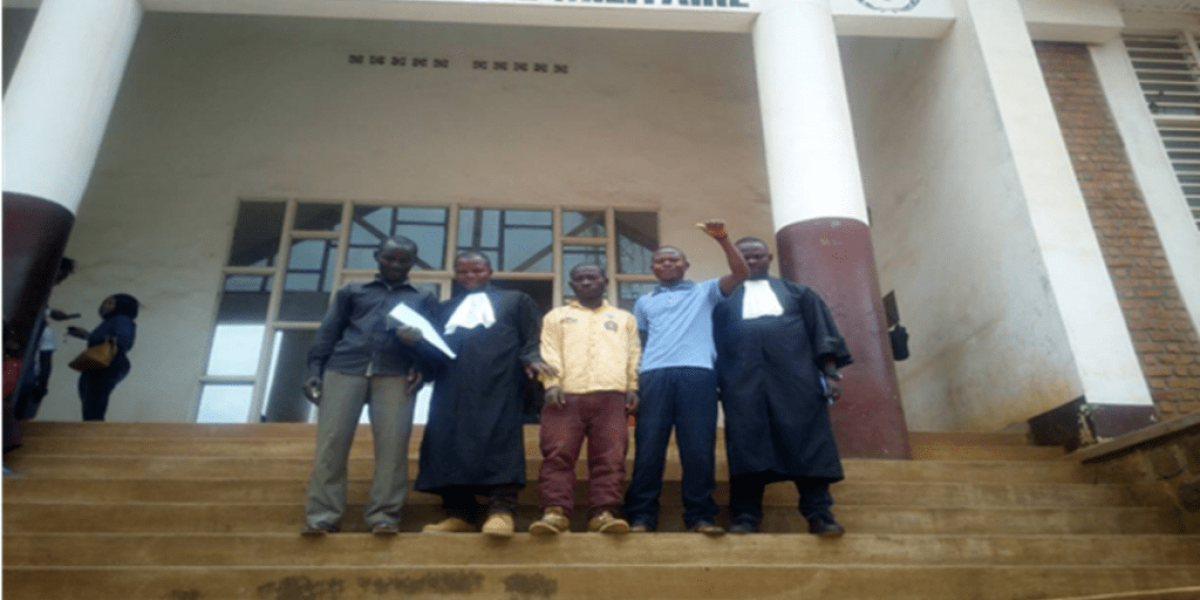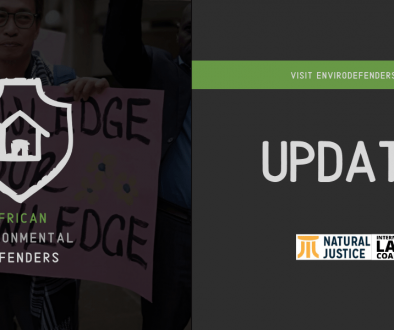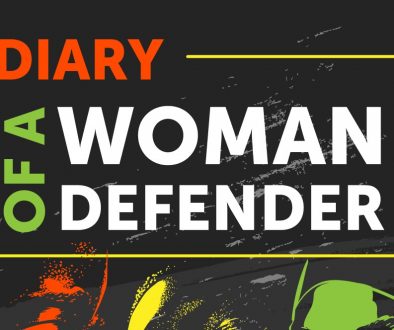Five Batwa finally freed after a year in prison without trial
On 15 September 2020, five Batwa men who had been detained in prison in Bukavu in the Democratic Republic of Congo (DRC) since August 2019 were released and are all, at long last, back home with their families. This is thanks to the tireless work of Forest Peoples Programme’s (FPP) partner, Centre d’Accompagnement des Autochtones Pygmées et Minoritaires Vulnérables (CAMV) and the legal team they have been working with in Bukavu, with the financial support provided by the African Environmental Defenders Emergency Fund.
The five men, arrested in February and October last year, and imprisoned without trial, were accused of the illegal possession of weapons and the participation in a militia (Raiya Mutomboki). This was in the context of Kahuzi-Biega National Park (KBNP) responding very aggressively to the return of Batwa communities to their ancestral lands. These Batwa had been evicted from their ancestral lands to make way for the Park. Some community members, tired of years of patient but utterly frustrating negotiations to try to return to the land, had finally returned.
Historical background of the Batwa struggle
The Batwa people living beside KBNP have spent the last 45 years demanding justice for the forcible expulsion of their community from their ancestral lands. In 1975, they were expelled from land where they had lived for centuries to make way for an extension of the Park. They were pushed into dwellings in the border areas of the park. In the subsequent years, they have become impoverished, losing significant cultural and linguistic heritage that was bound up in their traditional practices. They have been dispossessed by an approach to conservation that assumes that communities and the preservation of biodiversity are incompatible.
In recent years, the tension between the Congolese Institute for the Conservation of Nature (ICCN) and Park authorities on the one hand, and indigenous communities on the other, has escalated. Attempts by Batwa community members to peacefully regain lands in the park, or at least access to traditional resources such as natural medicines, have resulted in dramatic incidents. There has been an estimated ten deaths of Batwa community members over recent years.
Since 2014, several attempts at negotiation have failed. Park officials and the ICCN continue to demonstrate little commitment to dialogue or peaceful resolution of the conflict. Three different “dialogues”, including the Whakatane Dialogue, have been held between members of Batwa communities and ICCN, but none of these have resulted in significant changes to the Batwa’s circumstances.
In October 2018, a group of Batwa men moved into the Park to make a stand and reclaim their rights to the land. Deprived of any means of subsistence, these Batwa had no choice but to return to the Park. Unfortunately, the Batwa’s incursion into the Park was met with violence by the Park administration. The ICCN accused the Batwa of destroying the Park’s ecosystem. Some Batwa leaders were threatened by the security services, others (including women) were arrested and given very heavy jail sentences. In the aftermath, there were several confrontations between eco-guards and indigenous communities. At least ten Batwa were killed and several eco-guards also killed or injured during those clashes. It has become a vicious circle.
It is under these circumstances that six members of the Batwa indigenous community in Kahuzi-Biega (South Kivu) in the Democratic Republic of Congo were arrested in February and October 2019, respectively. One of them, Yonas Muderhwa, died in prison on 25 July 2019.

Legal support and humanitarian assistance to the Batwa
In June 2020, an application was made by FPP on behalf of the CAMV to the African Environmental Defenders Fund for funding for legal assistance for the Batwa members. The Defenders Fund responded to the lack of effective pro bono services in the judicial system. Three Batwa men arrested in February 2019, and sentenced to 5 years on 20 March 2020 for participation in a militia, appealed against the judgment. But, because of the lack of legal assistance, their case was never heard before the Court of Appeal.
In DRC, you need to make the necessary “diligences” so that your case can be settled before a tribunal or court. It means that the defendants needed to pay for a lawyer themselves, which was unaffordable for them. As a result, the three Batwa men remained in jail for more than a year until the funds were accessed from the Defenders Fund.
FPP’s partner in Bukavu hired a law firm to assist the five Batwa before the judicial authorities, including the Tribunal militaire de Garnison (TMG) of Bukavu and the South Kivu Military Court. Two other Batwa men have been detained without trial since October 2019. They were prosecuted for illegal possession of weapons and ammunition. CAMV contracted local barristers in Bukavu to follow up on their case. As a result of this legal support, all charges were discharged and they were thankfully released on 10 September 2020.
Prison conditions are very precarious in Bukavu Central Prison. In most of the prisons in DRC, prisoners are abandoned to their sad fate. Cases of deaths are regularly reported in this prison due to the lack of adequate care. This was the case of Twa Yonas Muderhwa, imprisoned with the others in February 2019, who died in prison after five months on 25 July 2019. Fortunately, upon reception of the fund, CAMV was able to bring food and medicine to the five Batwa detainees in Bukavu central prison until their release.

Batwa leaders and their support organisation face further risks due to their role in defending land rights and environment
Recently, the management of Kahuzi-Biega National Park has published unfounded accusations that may incite violence and exacerbate threats against indigenous leaders and their support organisations, including FPP and CAMV. The official spokesperson of KBNP accused a prominent Batwa leader, Jean-Marie Kasula (whom FPP supports in another court case) of carrying out an armed attack on a convoy of vehicles, which included the provincial Minister of Agriculture. The article also suggests that CAMV and FPP could have provided the weapons for this attack. In the context of South Kivu, where instability and insecurity are, sadly, the norm, this kind of unsubstantiated public statement is incredibly dangerous. We fear for the safety of M. Kasula and his family and for the safety of our friends and colleagues at CAMV.
The five Batwa men released in September may face continued threats by the park management in future. These men are hunters-gatherer and farmers. They were arrested according to strict regulations restricting access to the national park. They were carrying out subsistence activities which include traditional hunting and farming, which are supposed to be “illegal” in the context of national park.
Traditional activities seen as a “threat” to conservation
The possibility for indigenous communities to exercise user rights, such as the collection of non-timber forest products, honey harvesting, and subsistence hunting have been affected by coercive law enforcement of PNKB administration. Added to that, the park administration often uses these minor infractions to spread conspiracies against certain community leaders. In the case of the five Batwa men, traditional hunting was exaggerated and categorised as a threat to state security and public order. They are still facing risks, because of their role within the community as leaders, but above all, because their family members are still settled in the Park.
Indigenous people across the world are finding themselves sidelined from decision-making about their land and livelihoods, pushed to the margins of their territories and criminalised for carrying out livelihoods activities they have done for thousands of years in the name of “conservation”. The creation of the Park has left the Batwa destitute and corroded their indigenous livelihoods. The criminalisation of their traditional activities, which lead to the detention of six Batwa community leaders and the death of one of the members, is unconscionable. The government of the DRC must take actions to tackle the issue of landlessness within the Batwa community and come to an agreement which will see them free to enter the Park to be able to hunt and gather.
Lassana Koné
Lawyer, Legal and Human Rights Programme
Forest Peoples Programme



